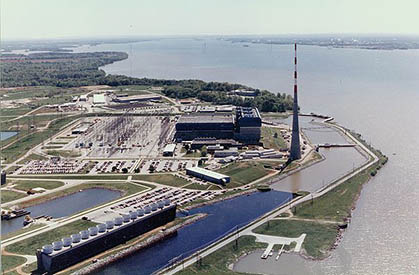Introduction
Coal, oil, and natural gas are all efficient forms of energy that we use to generate power for our everyday lives. However, these energy sources can create major environmental problems — such as water and air pollution. These sources of energy are also limited — nonrenewable — which means that they will not last forever. In this unit, you will be examining alternative sources of energy and how they compare with fossil fuels in terms of efficiency and how they impact the environment. In this lesson, you will examine nuclear energy as an alternative source of energy for producing electricity.

Browns Ferry nuclear power plant near Athens, Alabama.
| Lesson Objectives |
|
Following successful completion of this lesson, students will be able to...
Enduring Understanding:
The above objectives correspond with the Alabama Course of Study: Environmental Science 1 This lesson incorporates the following Literacy Standards: R1, R2, R3, R4, R5, R6, R7, R10, W1, W2, W3, W4, W8, W9, and W10 |
 |